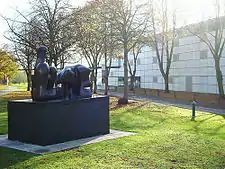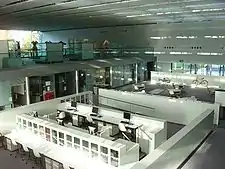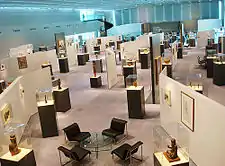School of Art History and World Art Studies (UEA)
The School of Art History and World Art Studies is a School in the Faculty of Arts and Humanities at the University of East Anglia.



History
The School originally provided courses in both art history and music, and was created in 1964 as the School of Fine Arts and Music.[1] It was later renamed the School of Art History and Music and then the School of World Art Studies & Museology before taking on its present name in 2013.
It focuses on the study of the history of art and architecture from a global perspective. After 1978, following the gift to the University of the Sir Robert and Lady Lisa Sainsbury Collection of art from around the world, the School was relocated to purpose-built facilities in the Sainsbury Centre for Visual Arts, designed by Sir Norman Foster. The School changed its name in 1992 to reflect a more cross-discipline approach to the study of art. Courses on offer at the School represent a broad spectrum of art history - including medieval and Renaissance European art, contemporary art, ancient art, and African art. The School brings together staff, students, and researchers interested in the history of art as well as archaeology, anthropology and museum studies.[2]
Rankings
The School is ranked first for research (History of Art, Architecture and Design) in the 2008 Research Assessment Exercise of UK universities,[3] and achieved the joint highest student satisfaction rating for an art history department, according to the 2009 National Student Survey. The School is one of the top three Art History departments in the UK, according to The Times Good University Guide 2010 [4]
Centre for African Art and Archaeology
The Centre for African Art and Archaeology is a research centre established in October 2009 in response to the convergence of research and teaching interests related to Africa, in the University's School of Art History and World Art Studies, and Sainsbury Research Unit. Located in the Sainsbury Centre for Visual Arts, the primary research interests of the Centre relate to the visual and material culture of Africa. The role of the Centre is to coordinate research interests, bringing together the activities of staff and students to foster the development of research and teaching on the arts, archaeology, and cultural heritage of the African continent.
Notable alumni
- Paul Atterbury, antiques expert
- Tim Bentinck, 12th Earl of Portland, actor and former Crossbench peer
- Andrew Bolton, Curator in Chief of the Anna Wintour Costume Center
- Alissandra Cummins, Director of the Barbados Museum & Historical Society
- Robin Devereux, 19th Viscount Hereford, Director of Valuations at Bonhams
- Tessa Jackson, Director of InIVA
- Penny Johnson, Director of the Government Art Collection
- Avril Joy, Costa Book Award winning author
- Marcus Leaver, publishing executive
- Jack Lohman, Director of the Royal British Columbia Museum
- Philip Mould, art historian
- Prince Jonathan Doria Pamphilj, of the Doria Pamphilj Gallery
- Vicki Pepperdine, actress
- Catherine Rabett, actress
- Mark Stone, Sky News Europe Correspondent and Emmy Award winning journalist
- Hassan Wario, Kenyan Cabinet Minister
- Boris Wastiau, Director of the Musée d'ethnographie de Genève
Notable faculty
- John Onians, architectural historian
- Christina Riggs, historian of archaeology
References
- Sanderson, Michael (2002). The history of the University of East Anglia, Norwich. Continuum International Publishing Group. pp. 95–8. Retrieved 26 October 2011.
- "World Art Studies and Museumology" (PDF). Uea.ac.uk. Retrieved 2013-09-07.
- "RAE 2008 : Quality profiles". Rae.ac.uk. Retrieved 2013-09-07.
- David Sanderson. "The Times | UK News, World News and Opinion". Extras.timesonline.co.uk. Retrieved 2013-09-07.
External links
| Wikimedia Commons has media related to School of World Art Studies and Museology, University of East Anglia, UK. |
